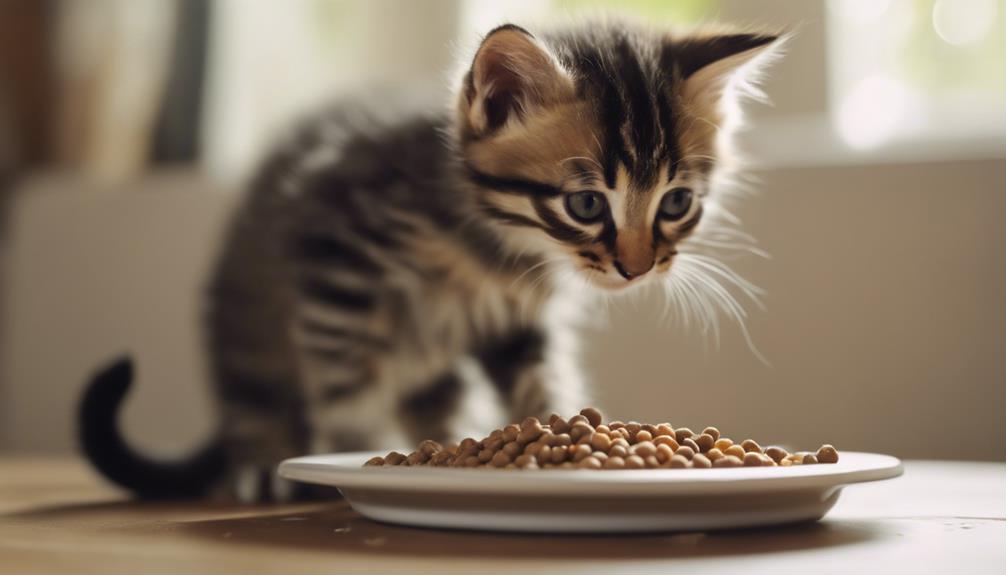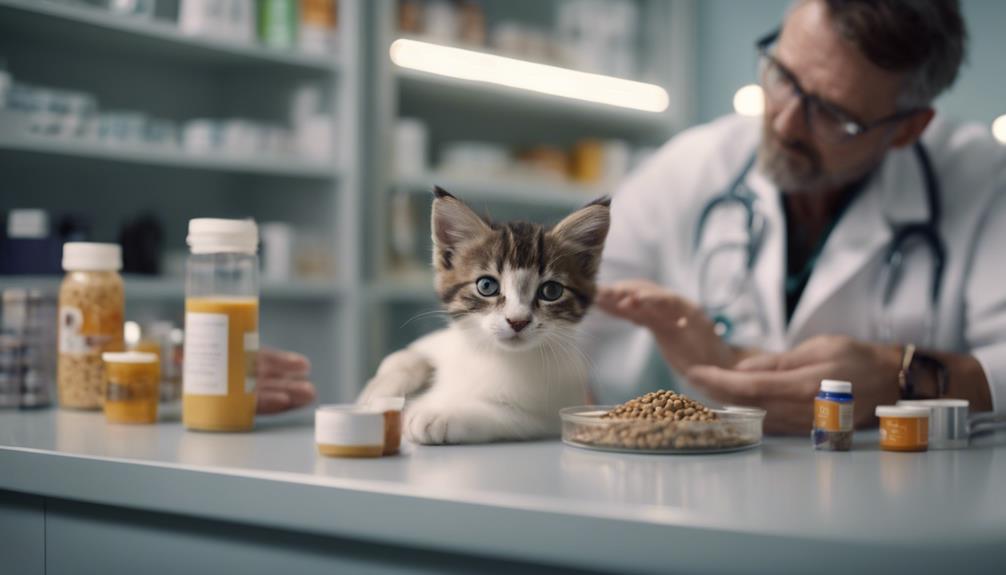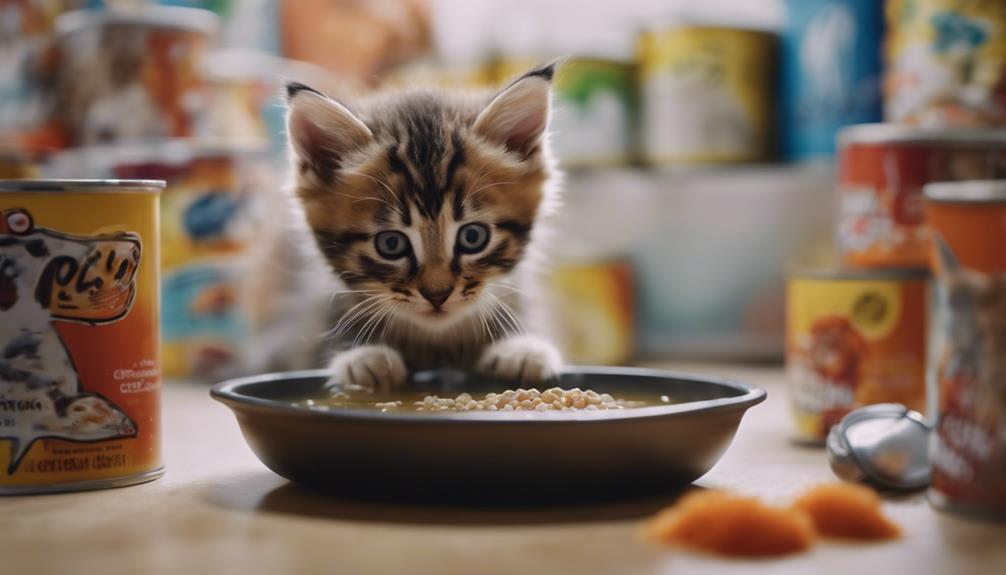In the world of feline care, the significance of providing optimal nutrition for kittens cannot be overstated. As these young companions undergo a crucial period of growth, their dietary requirements differ markedly from those of adult cats.
The nuances of selecting the right blend of nutrients, whether through wet or dry food options, can present a challenge for pet owners striving to nurture their kittens effectively.
By exploring the essential advice and considerations outlined in this guide, you can equip yourself with the knowledge needed to make well-informed choices that will impact your kitten's well-being profoundly.
Key Takeaways
- Kittens require higher nutrition for growth.
- Offer a mix of wet and dry food.
- Consult a vet before changing diets.
- Choose foods meeting AAFCO standards.
Kitten's Nutritional Needs
Kitten nutrition plays a pivotal role in supporting the optimal growth and development of young felines. Due to their rapid growth rate, kittens have higher nutritional requirements than adult cats. It is crucial to provide a balanced diet that meets these needs.
When choosing kitten food, look for products with meat listed as a top ingredient, meeting AAFCO standards for balanced nutrition. Consulting a veterinarian before changing a kitten's diet is advisable to ensure it aligns with the kitten's specific requirements.
Additionally, recommendations for the best kitten food brands can be obtained from veterinary professionals to guarantee the provision of essential nutrients for a strong and healthy kitten growth.
Feeding Schedule for Kittens
Implementing a structured feeding regimen is essential for ensuring optimal nutrition and growth for young felines.
Kittens should be fed free-choice from 8 weeks to around 6 months to meet their increased nutritional requirements. Leaving small servings of food out for kittens to eat multiple times a day is recommended.
Mixing wet and dry food can aid in the transition to solid food. It's crucial to expose kittens to both canned and dry food for future food acceptance.
Food Acceptance Tips for Kittens

To ensure successful food acceptance for kittens, it is essential to gradually introduce a variety of textures and flavors early on in their feeding routine. This can help prevent picky eating habits and ensure they receive a well-rounded diet. Here are some tips to help with food acceptance for kittens:
- Start with small portions of different types of food.
- Mix wet and dry food to help kittens transition to solid food.
- Offer a variety of protein sources like chicken, fish, and turkey.
- Use puzzle feeders or interactive toys to make mealtime engaging.
- Avoid sudden diet changes to prevent digestive upset.
Choosing the Right Kitten Food
When selecting the appropriate nourishment for a growing feline companion, it is essential to prioritize formulations that meet their distinctive nutritional requirements. Kittens have specific needs for proper growth and development, making the choice of kitten food crucial. Here is a comparison table to help you choose the right kitten food:
| Brand/Type | Key Features | Benefits |
|---|---|---|
| Purina Pro Plan Kitten Shredded Blend | Fortified with essential nutrients | Supports healthy growth |
| IAMS Perfect Portions Grain Free | Contains DHA and vitamin E for development | Great for transitioning to solid food |
| Wellness Complete Health Kitten Formula | Balanced calories, fat, and protein | Promotes heart and health development |
Ensure the selected food meets AAFCO standards and consult your veterinarian for personalized advice.
Veterinarian's Diet Consultation Importance

Seeking guidance from a veterinarian regarding your kitten's dietary needs is essential for ensuring optimal health and growth. Here are five reasons why a veterinarian's diet consultation is crucial:
- Veterinarians can provide personalized recommendations based on your kitten's specific needs.
- They can help identify any dietary deficiencies or excesses that may be impacting your kitten's health.
- Veterinarians are knowledgeable about the latest research and developments in feline nutrition.
- They can advise on the appropriate balance of nutrients to support your kitten's growth and development.
- Regular consultations with a vet can help monitor your kitten's progress and make necessary adjustments to their diet as they grow.
Top Recommended Dry Kitten Food
Understanding the significance of providing appropriate nutrition for kittens, particularly in the context of dry food options, is paramount for their optimal growth and well-being.
When choosing dry kitten food, look for high-quality brands that prioritize meat as a primary ingredient. Brands like Purina Pro Plan Kitten Shredded Blend Chicken and Rice Formula Dry Cat Food offer fortified nutrients such as DHA, live probiotics, and essential vitamins to support strong and healthy growth.
It is crucial to ensure that the chosen dry food meets AAFCO standards for balanced nutrition. Consulting with a veterinarian before making any dietary changes for kittens is advisable to ensure their specific needs are met.
Wet Food Transition for Kittens

Transitioning kittens to wet food is a crucial step in their nutritional development to support their growth and overall well-being. Here are some important tips for transitioning kittens to wet food:
- Gradually mix wet food with their current diet to avoid digestive upset.
- Offer a variety of wet food flavors to find out your kitten's preferences.
- Ensure the wet food is specifically formulated for kittens to meet their unique nutritional needs.
- Monitor your kitten's weight and overall health during the transition period.
- Seek guidance from a veterinarian if you encounter any difficulties or concerns.
Best Canned Food for Kittens
To ensure optimal nutrition for kittens, selecting the best canned food plays a crucial role in supporting their growth and overall well-being. When choosing canned food for kittens, it is important to opt for high-quality options that provide balanced nutrition.
One recommended choice is Wellness Complete Health Kitten Formula Grain-Free Canned Cat Food. This all-natural formulation offers balanced calories, fat, and protein tailored for growing kittens. Additionally, the inclusion of taurine promotes heart and eye health development in kittens.
Ensuring that kittens receive the necessary nutrients from their canned food is essential for their healthy development and well-being. Consulting with a veterinarian can also provide guidance in selecting the best canned food for your kitten's specific needs.
Ensuring Balanced Kitten Nutrition

Ensuring balanced kitten nutrition is essential for supporting their healthy growth and development.
- Provide a high-quality kitten food that meets AAFCO standards for balanced nutrition.
- Ensure the food contains essential nutrients like protein, fat, vitamins, and minerals.
- Offer a mix of wet and dry food to help with hydration and texture preferences.
- Consult a veterinarian to determine the right feeding schedule and portion sizes for your kitten.
- Monitor your kitten's weight and growth to adjust their diet accordingly for optimal health.
Frequently Asked Questions
Can Kittens Be Allergic to Certain Ingredients in Their Food?
Kittens can indeed be allergic to certain ingredients in their food. It is crucial to monitor for signs of allergies such as itching, gastrointestinal issues, or skin problems. Consult a veterinarian promptly for appropriate diagnosis and dietary adjustments.
How Can Environmental Factors Impact a Kitten's Nutritional Needs?
Environmental factors such as temperature, humidity, and stress can influence a kitten's nutritional needs. Extreme conditions may alter metabolism and nutrient requirements. Monitoring these factors and adjusting diet accordingly with professional guidance ensures optimal kitten health and growth.
Are There Specific Feeding Techniques for Kittens With Picky Eating Habits?
When dealing with kittens exhibiting picky eating habits, offer a variety of textures and flavors to encourage acceptance of different foods. Gradually introduce new options, maintain a consistent feeding schedule, and consult with a veterinarian for tailored advice.
What Role Does Hydration Play in a Kitten's Overall Nutrition?
Hydration is crucial for a kitten's overall nutrition. It supports proper digestion, kidney function, and body temperature regulation. Adequate water intake is vital for overall health and well-being in kittens, ensuring they stay hydrated and thrive.
Are There Alternative Protein Sources for Kittens Aside From Traditional Meat Options?
Kittens can benefit from alternative protein sources like fish, eggs, and dairy to provide a diverse nutritional profile. These options offer essential amino acids necessary for growth and development, ensuring a balanced diet for their overall health.
What are the Best Nutrition Tips for a New Kitten?
When bringing home a new kitten, it’s important to have the essential supplies for a new kitten ready to ensure they are properly cared for. Nutrition is crucial, so focus on high-quality kitten food, plenty of fresh water, and occasional treats. A balanced diet is key for a healthy, growing kitten.
Conclusion
In conclusion, understanding and meeting a kitten's nutritional needs is essential for their growth and health. By following a proper feeding schedule, choosing the right food, and consulting with a veterinarian, cat owners can ensure their kitten receives a balanced diet.
Transitioning between different types of food, such as dry and wet options, can further support their overall well-being. Prioritizing kitten nutrition sets the stage for a healthy and happy life for your feline companion.




